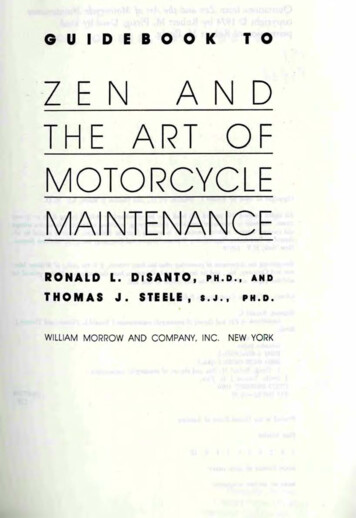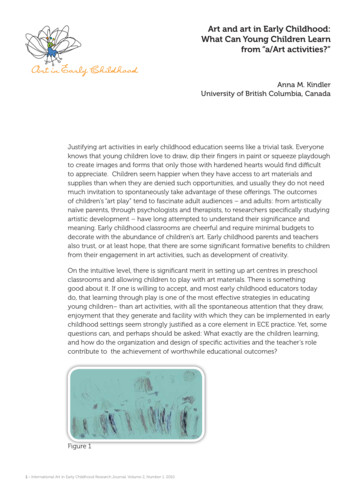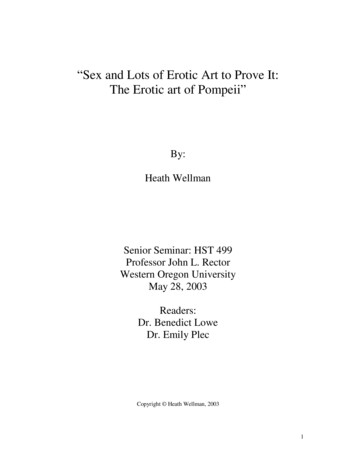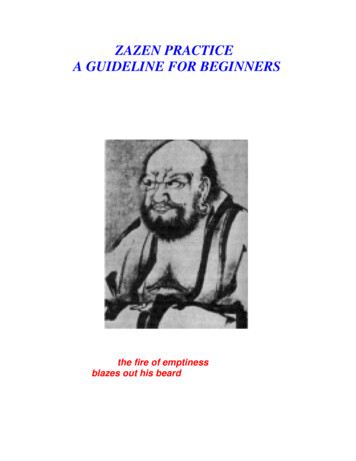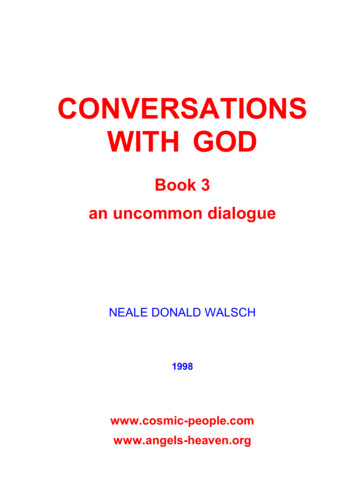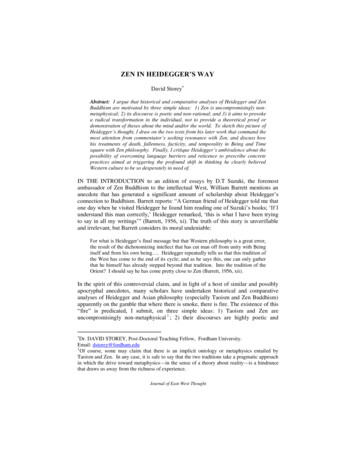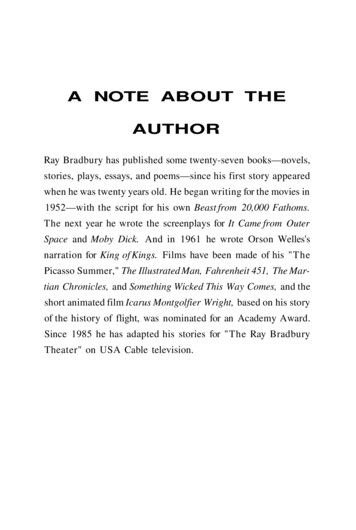
Transcription
A NOTE ABOUT THEAUTHORRay Bradbury has published some twenty-seven books—novels,stories, plays, essays, and poems—since his first story appearedwhen he was twenty years old. He began writing for the movies in1952—with the script for his own Beast from 20,000 Fathoms.The next year he wrote the screenplays for It Came from OuterSpace and Moby Dick. And in 1961 he wrote Orson Welles'snarration for King of Kings. Films have been made of his "ThePicasso Summer," The Illustrated Man, Fahrenheit 451, The Martian Chronicles, and Something Wicked This Way Comes, and theshort animated film Icarus Montgolfier Wright, based on his storyof the history of flight, was nominated for an Academy Award.Since 1985 he has adapted his stories for "The Ray BradburyTheater" on USA Cable television.
ZENIN THEARTOFW R I T I N GRAY BRADBURYJOSHUA ODELL EDITIONSSANTA BARBARA1996
Copyright 1994 Ray Bradbury Enterprises.All rights reserved under International and Pan-American CopyrightConventions.Owing to limitations of space, acknowledgments to reprint may be found onpage 165.Published by Joshua Odell EditionsPost Office Box 2158, Santa Barbara, CA 93120Library of Congress Cataloging-in-Publication DataBradbury, Ray, 1920—Zen in the art of writing.1. Bradbury, Ray, 1920—Authorship.2. Creative ability.3. Authorship. 4. Zen Buddhism.I. Title.PS3503. 167478 1989808'.os89-25381ISBN 1-877741-09-4Printed in the United States of America.Designed by The Sarabande Press
TO MY FINEST TEACHER,JENNET JOHNSON,WITH LOVE
CONTENTSPREFACExiTHE JOY OF W R I T I N G3RUN FAST, STAND STILL, OR, THE THING AT THE TOP OF THESTAIRS, OR, NEW GHOSTS FROM OLD MINDS13HOW TO KEEP AND FEED A MUSE31DRUNK, AND IN CHARGE OF A BICYCLE49INVESTING DIMES: FAHRENHEIT 4 5 169JUST THIS SIDE OF BYZANTIUM: DANDELION WINE79
THE LONG ROAD TO MARS91ON THE SHOULDERS OF GIANTS99THE SECRET MIND111SHOOTING HAIKU IN A BARREL125ZEN IN THE ART OF WRITING139. . . O N CREATIVITY157
HOW TO C L I M B T H ETREE OFLIFE,THROWROCKS AT Y O U R S E L F ,ANDGETDOWNWITHOUTYOURAGAINBREAKINGBONES OR YOURSPIRITA PREFACE W I T H ATITLENOTLONGERM UCHTHANBOOKTHE
Sometimes I am stunned at mycapacity as a nine-year-old, to understand my entrapment andescape it.How is it that the boy I was in October, 1929, could, because ofthe criticism of his fourth grade schoolmates, tear up his BuckRogers comic strips and a month later judge all of his friendsidiots and rush back to collecting?Where did that judgment and strength come from? What sortof process did I experience to enable me to say: I am as good asdead. Who is killing me? What do I suffer from? What's the cure?I was able, obviously, to answer all of the above. I named thesickness: my tearing up the strips. I found the cure: go back tocollecting, no matter what.I did. And was made well.But still. At that age? When we are accustomed to respondingto peer pressure?Where did I find the courage to rebel, change my life, livealone?I don't want to over-estimate all this, but damn it, I love thatnine-year-old, whoever in hell he was. Without him, I could nothave survived to introduce these essays.
P R E FAC EPart of the answer, of course, is in the fact that I was so madly inlove with Buck Rogers, I could not see my love, my hero, my life,destroyed. It is almost that simple. It was like having your best allround greatest-loving-buddy, pal, center-of-life drown or get shotgun killed. Friends, so killed, cannot be saved from funerals. BuckRogers, I realized, might know a second life, if I gave it to him. So Ibreathed in his mouth and, lo !, he sat up and talked and said, what?Yell. Jump. Play. Out-run those sons-of-bitches. They'll neverlive the way you live. Go do it.Except I never used the S.O.B. words. They were not allowed.Heck! was about the size and strength of my outcry. Stay alive!So I collected comics, fell in love with carnivals and World'sFairs and began to write. And what, you ask, does writing teachus?First and foremost, it reminds us that we are alive and that it is agift and a privilege, not a right. We must earn life once it has beenawarded us. Life asks for rewards back because it has favored uswith animation.So while our art cannot, as we wish it could, save us from wars,privation, envy, greed, old age, or death, it can revitalize usamidst it all.Secondly, writing is survival. Any art, any good work, ofcourse, is that.Not to write, for many of us, is to die.We must take arms each and every day, perhaps knowing thatthe battle cannot be entirely won, but fight we must, if only aXII
P R E FAC Egentle bout. The smallest effort to win means, at the end of eachday, a sort of victory. Remember that pianist who said that if hedid not practice every day he would know, if he did not practicefor two days, the critics would know, after three days, his audiences would know.A variation of this is true for writers. Not that your style,whatever that is, would melt out of shape in those few days.But what would happen is that the world would catch up withand try to sicken you. If you did not write every day, the poisonswould accumulate and you would begin to die, or act crazy, orboth.You must stay drunk on writing so reality cannot destroy you.For writing allows just the proper recipes of truth, life, realityas you are able to eat, drink, and digest without hyperventilatingand flopping like a dead fish in your bed.I have learned, on my journeys, that if I let a day go by withoutwriting, I grow uneasy. Two days and I am in tremor. Three and Isuspect lunacy. Four and I might as well be a hog, suffering theflux in a wallow. An hour's writing is tonic. I'm on my feet,running in circles, and yelling for a clean pair of spats.So that, in one way or another, is what this book is all about.Taking your pinch of arsenic every morn so you can survive tosunset. Another pinch at sunset so that you can more-thansurvive until dawn.The mirco-arsenic-dose swallowed here prepares you not to bepoisoned and destroyed up ahead.XIII
P R E FAC EWork in the midst of life is that dosage. To manipulate life, tossthe bright-colored orbs up to mix with the dark ones, blending avariation of truths. We use the grand and beautiful facts ofexistence in order to put up with the horrors that afflict usdirectly in our families and friends, or through the newspapersand T.V.The horrors are not to be denied. Who amongst us has not hada cancer-dead friend? Which family exists where some relativehas not been killed or maimed by the automobile? I know of none.In my own circle, an aunt, and uncle, and a cousin, as well as sixfriends, have been destroyed by the car. The list is endless andcrushing if we do not creatively oppose it.Which means writing as cure. Not completely, of course. Younever get over your parents in the hospital or your best love in thegrave.I won't use the word "therapy," it's too clean, too sterile aword. I only say when death slows others, you must leap to set upyour diving board and dive head first into your typewriter.The poets and artists of other years, long past, knew all andeverything I have said here, or put in the following essays. Aristotle said it for the ages. Have you listened to him lately?These essays were written at various times over a thirty-yearperiod, to express special discoveries, to serve special needs. Butthey all echo the same truths of explosive self-revelation andcontinuous astonishment at what your deep well contains if youjust haul off and shout down it.XIV
PREFACEEven as I write this, a letter has come from a young, unknownwriter, who says he is going to live by my motto, found in myToynbee Convector." . . . to gently lie and prove the lie true . . . everything is finallya promise . . . what seems a lie is a ramshackle need, wishing to beborn. ."And now:I have come up with a new simile to describe myself lately. Itcan be yours.Every morning I jump out of bed and step on a landmine. The Ilandmine is me.After the explosion, I spend the rest of the day putting thepieces together.Now, it's your turn. Jump!XV
THE JOY OF WRITING
Zest. Gusto. How rarely onehears these words used. How rarely do we see people living, or forthat matter, creating by them. Yet if I were asked to name themost important items in a writer's make-up, the things that shapehis material and rush him along the road to where he wants to go,I could only warn him to look to his zest, see to his gusto.You have your list of favorite writers; I have mine.Dickens,Twain, Wolfe, Peacock, Shaw, Molière, Jonson, Wycherly, SamJohnson. Poets: Gerard Manley Hopkins, Dylan Thomas, Pope.Painters: El Greco, Tintoretto. Musicians: Mozart, Haydn,Ravel, Johann Strauss (!). Think of all these names and you thinkof big or little, but nonetheless important, zests, appetites, hungers. Think of Shakespeare and Melville and you think ofthunder, lightning, wind. They all knew the joy of creating inlarge or small forms, on unlimited or restricted canvasses. Theseare the children of the gods. They knew fun in their work. Nomatter if creation came hard here and there along the way, orwhat illnesses and tragedies touched their most private lives. Theimportant things are those passed down to us from their handsand minds and these are full to bursting with animal vigor and3
Z E NI NT H EA R TO FW R I T I N Gintellectual vitality. Their hatreds and despairs were reportedwith a kind of love.Look at El Greco's elongation and tell me, if you can, that hehad no joy in his work? Can you really pretend that Tintoretto'sGod Creating the Animals of the Universe is a work founded onanything less than "fun" in its widest and most completely involved sense? The best jazz says, "Gonna live forever; don'tbelieve in death." The best sculpture, like the head of Nefertiti,says again and again, "The Beautiful One was here, is here, andwill be here, forever." Each of the men I have listed seized a bit ofthe quicksilver of life, froze it for all time and turned, in the blazeof their creativity, to point at it and cry, "Isn't this good!" And itwas good.What has all this to do with writing the short story in ourtimes?Only this: if you are writing without zest, without gusto,without love, without fun, you are only half a writer. It means youare so busy keeping one eye on the commercial market, or one earpeeled for the avant-garde coterie, that you are not being yourself.You don't even know yourself. For the first thing a writer shouldbe is—excited. He should be a thing of fevers and enthusiasms.Without such vigor, he might as well be out picking peaches ordigging ditches; God knows it'd be better for his health.How long has it been since you wrote a story where your reallove or your real hatred somehow got onto the paper? When wasthe last time you dared release a cherished prejudice so it4
T H EJ O YO FW R I T I N Gslammed the page like a lightning bolt? What are the best thingsand the worst things in your life, and when are you going to getaround to whispering or shouting them?Wouldn't it be wonderful, for instance, to throw down a copy ofHarper's Bazaar you happened to be leafing through at the dentist's, and leap to your typewriter and ride off with hilariousanger, attacking their silly and sometimes shocking snobbishness? Years ago I did just that. I came across an issue where theBazaar photographers, with their perverted sense of equality,once again utilized natives in a Puerto Rican backstreet as propsin front of which their starved-looking mannikins postured forthe benefit of yet more emaciated half-women in the best salons inthe country. The photographs so enraged me I ran, did not walk,to my machine and wrote "Sun and Shadow," the story of an oldPuerto Rican who ruins the Bazaar photographer's afternoon bysneaking into each picture and dropping his pants.I dare say there are a few of you who would like to have donethis job. I had the fun of doing it; the cleansing after effects of thehoot, the holler, and the great horselaugh. Probably the editors atthe Bazaar never heard. But a lot of readers did and cried, "Go it,Bazaar, go it, Bradbury!" I claim no victory. But there was bloodon my gloves when I hung them up.When was the last time you did a story like that, out of pureindignation?When was the last time you were stopped by the police in yourneighborhood because you like to walk, and perhaps think, at5
Z E NI NT H EA R TO FW R I T I N Gnight? It happened to me just often enough that, irritated, Iwrote "The Pedestrian," a story of a time, fifty years from now,when a man is arrested and taken off for clinical study because heinsists on looking at un-televised reality, and breathing un-airconditioned air.Irritations and angers aside, what about loves? What do youlove most in the world? The big and little things, I mean. Atrolley car, a pair of tennis shoes? These, at one time when wewere children, were invested with magic for us. During the pastyear I've published one story about a boy's last ride in a trolleythat smells of all the thunderstorms in time, full of cool—greenmoss-velvet seats and blue electricity, but doomed to be replacedby the more prosaic, more practical-smelling bus. Another storyconcerned a boy who wanted to own a pair of new tennis shoes forthe power they gave him to leap rivers and houses and streets, andeven bushes, sidewalks, and dogs. The shoes were to him, thesurge of antelope and gazelle on African summer veldt. Theenergy of unleashed rivers and summer storms lay in the shoes; hehad to have them more than anything else in the world.So, simply then, here is my formula.What do you want more than anything else in the world? Whatdo you love, or what do you hate?Find a character, like yourself, who will want something or notwant something, with all his heart. Give him running orders.Shoot him off. Then follow as fast as you can go. The character, inhis great love, or hate, will rush you through to the end of the6
T H EJ O YO FW R I T I N Gstory. The zest and gusto of his need, and there is zest in hate aswell as in love, will fire the landscape and raise the temperature ofyour typewriter thirty degrees.All of this is primarily directed to the writer who has alreadylearned his trade; that is, has put into himself enough grammatical tools and literary knowledge so he won't trip himself up whenhe wants to run. The advice holds good for the beginner, too,however, even though his steps may falter for purely technicalreasons. Even here, passion often saves the day.The history of each story, then, should read almost like aweather report: Hot today, cool tomorrow. This afternoon, burndown the house. Tomorrow, pour cold critical water upon thesimmering coals. Time enough to think and cut and rewritetomorrow. But today—explode—fly apart—disintegrate! Theother six or seven drafts are going to be pure torture. So why notenjoy the first draft, in the hope that your joy will seek and findothers in the world who, reading your story, will catch fire, too?It doesn't have to be a big fire. A small blaze, candlelightperhaps; a longing for a mechanical wonder like a trolley or ananimal wonder like a pair of sneakers rabbiting the lawns of earlymorning. Look for the little loves, find and shape the little bitternesses. Savor them in your mouth, try them on your typewriter.When did you last read a book of poetry or take time, of anafternoon, for an essay or two? Have you ever read a single issue ofGeriatrics, the Official Journal of the American Geriatrics Society, a magazine devoted to "research and clinical study of the7
Z E NI NT H EA R TO FW R I T I N Gdiseases and processes of the aged and aging"? Or read, or evenseen, a copy of What's New, a magazine published by the AbbottLaboratories in North Chicago, containing articles such as"Tubocurarene for Cesarean Section" or "Phenurone in Epilepsy," but also utilizing poems by William Carlos Williams,Archibald Macleish, stories by Clifton Fadiman and Leo Rosten;covers and interior illustrations by John Groth, Aaron Bohrod,William Sharp, Russell Cowles? Absurd? Perhaps. But ideas lieeverywhere, like apples fallen and melting in the grass for lack ofwayfaring strangers with an eye and a tongue for beauty, whetherabsurd, horrific, or genteel.Gerard Manley Hopkins put it this way:Glory be to God for dappled things—For skies of couple-color as a brinded cow;For rose-moles all in stipple upon trout that swim;Fresh-firecoal chestnut-falls; finches' wings;Landscape plotted and pieced—fold, fallow, andplow;And all trades, their gear and tackle and trim.All things counter, original, spare, strange;Whatever is fickle, freckled (who knows how?)With swift, slow; sweet, sour; adazzle, dim;He fathers-forth whose beauty is past change:Praise Him.8
T H EJ O YO FW R I T I N GThomas Wolfe ate the world and vomited lava. Dickens dinedat a different table every hour of his life. Molière, tasting society,turned to pick up his scalpel, as did Pope and Shaw. Everywhereyou look in the literary cosmos, the great ones are busy loving andhating. Have you given up this primary business as obsolete inyour own writing? What fun you are missing, then. The fun ofanger and disillusion, the fun of loving and being loved, of movingand being moved by this masked ball which dances us from cradleto churchyard. Life is short, misery sure, mortality certain. Buton the way, in your work, why not carry those two inflated pigbladders labeled Zest and Gusto. With them, traveling to thegrave, I intend to slap some dummox's behind, pat a pretty girl'scoiffure, wave to a tad up a persimmon tree.Anyone wants to join me, there's plenty of room in Coxie'sArmy.19739
RUNSTILL,FAST,OR,STANDTHETHINGAT T H E TOP OF THES T A I R S , OR,GHOSTSN EWFROMMINDSOLD
R u n fast, stand still. This, thelesson from lizards. For all writers. Observe almost any survivalcreature, you see the same. Jump, run, freeze. In the ability toflick like an eyelash, crack like a whip, vanish like steam, here thisinstant, gone the next—life teems the earth. And when that life isnot rushing to escape, it is playing statues to do the same. See thehummingbird, there, not there. As thought arises and blinks off,so this thing of summer vapor; the clearing of a cosmic throat, thefall of a leaf. And where it was—a whisper.What can we writers learn from lizards, lift from birds? Inquickness is truth. The faster you blurt, the more swiftly youwrite, the more honest you are. In hesitation is thought. In delaycomes the effort for a style, instead of leaping upon truth which isthe only style worth deadfalling or tiger-trapping.In between the scurries and flights, what? Be a chameleon,ink-blend, chromosome change with the landscape. Be a petrock, lie with the dust, rest in the rainwater in the filled barrel bythe drainspout outside your grandparents' window long ago. Bedandelion wine in the ketchup bottle capped and placed with aninked inscription: June morn, first day of Summer, 1923. Sum-13
Z E NI NT H EA R TO FW R I T I N Gmer 1926, Fireworks Night. 1927: Last Day of Summer. LASTOF T H E DANDELIONS, Oct. 1st.And out of all this, wind up with your first success as a writer,at 20 a story, in Weird Tales.How do you commence to start to begin an almost new kind ofwriting, to terrify and scare?You stumble into it, mostly. You don't know what you're doing,and suddenly, it's done. You don't set out to reform a certain kindof writing. It evolves out of your own life and night scares.Suddenly you look around and see that you have done somethingalmost fresh.The problem for any writer in any field is being circumscribedby what has gone before or what is being printed that very day inbooks and magazines.I grew up reading and loving the traditional ghost stories ofDickens, Lovecraft, Poe, and later, Kuttner, Bloch, and ClarkAshton Smith. I tried to write stories heavily influenced byvarious of these writers, and succeeded in making quadruplelayered mudpies, all language and style, that would not float, andsank without a trace. I was too young to identify my problem, Iwas so busy imitating.I almost blundered into my creative self in my last year in highschool, when I wrote a kind of long remembrance of the deepravine in my home town, and my fear of it at night. But I had nostory to go with the ravine, so my discovering the true source ofmy future writing was put off for some few years.14
R U NF A S T ,S T A N DS T I L L.I wrote at least a thousand words a day every day from the ageof twelve on. For years Poe was looking over one shoulder, whileWells, Burroughs, and just about every writer in Astounding andWeird Tales looked over the other.I loved them, and they smothered me. I hadn't learned how tolook away and in the process look not at myself but at what wenton behind my face.It was only when I began to discover the treats and tricks thatcame with word association that I began to find some true waythrough the minefields of imitation. I finally figured out that ifyou are going to step on a live mine, make it your own. Be blownup, as it were, by your own delights and despairs.I began to put down brief notes and descriptions of loves andhates. All during my twentieth and twenty-first years, I circledaround summer noons and October midnights, sensing that theresomewhere in the bright and dark seasons must be somethingthat was really me.I finally found it one afternoon when I was twenty-two yearsold. I wrote the title "The Lake" on the first page of a story thatfinished itself two hours later. Two hours after that I was sitting atmy typewriter out on a porch in the sun, with tears running offthe tip of my nose, and the hair on my neck standing up.Why the arousal of hair and the dripping nose?I realized I had at last written a really fine story. The first, inten years of writing. And not only was it a fine story, but it wassome sort of hybrid, something verging on the new. Not a tradi15
Z E NI NT H EA R TO FW R I T I N Gtional ghost story at all, but a story about love, time, remembrance, and drowning.I sent it off to Julie Schwartz, my pulp agent, who liked it, butsaid it was not a traditional tale and might be hard to sell. WeirdTales walked around it, touched it with a ten-foot pole, and finallydecided, what the hey, to publish it, even though it didn't fit theirmagazine. But I must promise, next time, to write a good oldfashioned ghost story! I promised. They gave me twenty dollars,and everyone was happy.Well, some of you know the rest. "The Lake" has been reprinted dozens of times in the forty-four years since. And it wasthe story that first got various editors of other magazines to sit upand notice the guy with the aroused hair and the wet nose.Did I learn a hard, fast, or even an easy lesson from "TheLake"? I did not. I went back to writing the old-fashioned ghoststory. For I was far too young to understand much about writingat all, and my discoveries went unnoticed by me for years. I waswandering all over the place and writing poorly much of the time.During my early twenties, if my weird fiction was imitative,with an occasional surprise of a concept and a further surprise inexecution, my science—fiction writing was abysmal, and my detective fiction verged on the ludicrous. I was deeply under theinfluence of my loving friend, Leigh Brackett, whom I used tomeet every Sunday at Muscle Beach in Santa Monica, California,there to read her superior Stark on Mars tales, or to envy and tryto emulate her Flynn's Detective stories.16
RUNFAST,STANDSTILL.But along through those years I began to make lists of titles, toput down long lines of nouns. These lists were the provocations,finally, that caused my better stuff to surface. I was feeling myway toward something honest, hidden under the trapdoor on thetop of my skull.The lists ran something like this:THE LAKE. THE NIGHT. THE CRICKETS. THERAVINE. THE ATTIC. THE BASEMENT. THE TRAPDOOR. THE BABY. THE CROWD. THE NIGHT TRAIN.THE FOG HORN. THE SCYTHE. THE CARNIVAL.THE CAROUSEL. THE DWARF. THE MIRROR MAZE.THE SKELETON.I was beginning to see a pattern in the list, in these words that Ihad simply flung forth on paper, trusting my subconscious togive bread, as it were, to the birds.Glancing over the list, I discovered my old love and frighthaving to do with circuses and carnivals. I remembered, and thenforgot, and then remembered again, how terrified I had beenwhen my mother took me for my first ride on a merry-go-round.With the calliope screaming and the world spinning and theterrible horses leaping, I added my shrieks to the din. I did not gonear the carousel again for years. When I really did, decades later,it rode me into the midst of Something Wicked This Way Comes.But long before that, I went on making the lists. THEMEADOW. THE TOY CHEST. THE MONSTER. TYRANNOSAURUS REX. THE TOWN CLOCK. THE OLD17
Z E NI NT H EA R TO FW R I T I N GMAN. T H E OLD WOMAN. T H E T E L E P H O N E . T H ESIDEWALKS. T H E COFFIN. T H E ELECTRIC CHAIR.T H E MAGICIAN.Out on the margin of these nouns, I blundered into a sciencefiction story that was not a science-fiction story. My title was "Ris for Rocket." The published title was "King of the GreySpaces," the story of two boys, great friends, one elected to go offto the Space Academy, the other staying home. The tale wasrejected by every science-fiction magazine because, after all, itwas only a story about friendship being tested by circumstance,even though the circumstance was space travel. MaryGnaedinger, at Famous Fantastic Mysteries, took one look at mystory and published it. But, again, I was too young to see that "Ris For Rocket" would be the kind of story that would make me as ascience-fiction writer, admired by some, and criticized by manywho observed that I was no writer of science fictions, I was a"people" writer, and to hell with that!I went on making lists, having to do not only with night,nightmares, darkness, and objects in attics, but the toys that menplay with in space, and the ideas I found in detective magazines.Most of the detective material I published in my twenty-fourthyear in Detective Tales and Dime Detective is not worth rereading.Here and there, I fell over my own shoelaces and did a nearly goodjob of remembering Mexico, which scared me, or downtown LosAngeles during the Pachucho riots. But it would take me thebetter part of forty years to assimilate the detective/mystery/18
RUNFAST,STANDSTILL.suspense genre and make it work for me in my novel, Death Is aLonely Business.But back to my lists. And why go back to them? Where am Ileading you? Well, if you are a writer, or would hope to be one,similar lists, dredged out of the lopside of your brain, might wellhelp you discover you, even as I flopped around and finally foundme.I began to run through those lists, pick a noun, and then sitdown to write a long prose-poem-essay on it.Somewhere along about the middle of the page, or perhaps onthe second page, the prose poem would turn into a story. Whichis to say that a character suddenly appeared and said, "That'sme"; or, "That's an idea I like!" And the character would thenfinish the tale for me.It began to be obvious that I was learning from my lists ofnouns, and that I was further learning that my characters woulddo my work for me, if I let them alone, if I gave them their heads,which is to say, their fantasies, their frights.I looked at my list, saw SKELETON, and remembered thefirst artworks of my childhood. I drew skeletons to scare my girlcousins. I was fascinated with those unclothed medical displaysof skulls and ribs and pelvic sculptures. My favorite tune was"'Tain't No Sin, To Take Off Your Skin, and Dance Around inYour Bones."Remembering my early artwork and my favorite tune, I ambledinto my doctor's office one day with a sore throat. I touched my19
Z E NI NT H EA R TO FW R I T I N GAdam's apple, and the tendons on each side of my neck, and askedfor his medical advice."Know what you're suffering from?" asked the doc."What?""Discovery of the larynx!" he crowed. "Take some aspirin.Two dollars, please!"Discovery of the larynx! My God, how beautiful! I trottedhome, feeling my throat, and then my ribs, and then my medullaoblongata, and my kneecaps. Holy Moses! Why not write a storyabout a man who is terrified to discover that under his skin, insidehis flesh, hidden, is a symbol of all the Gothic horrors in history—a skeleton!The story wrote itself in a few hours.A perfectly obvious concept, yet no one else in the history ofwriting weird tales had ever scribbled it down. I fell into mytypewriter with it and came up with a brand-new, absolutelyoriginal tale, which had been lurking under my skin since I firstdrew a skull and crossbones, aged six.I began to gain steam. The ideas came faster now, and all ofthem from my lists. I prowled up in my grandparents' attics anddown in their basements. I listened to the middle-of-the-nightlocomotives wailing across the northern Illinois landscape, andthat was death, a funeral train, taking my loved ones away to somefar graveyard. I remembered five o'clock in the morning, predawn arrivals of Ringling Brothers, Barnum and Bailey, and allthe animals parading by before sunrise, heading for the empty20
R U NF A S T ,S T A N DS T I L L.meadows where the great tents would rise like incredible mushrooms. I remembered Mr. Electrico and his traveling electricchair. I remembered Blackstone the Magician dancing magicalhandkerchiefs and vanishing elephants on my hometown stage. Iremembered my grandfather, my sister, and various aunts andcousins, in their coffins and gone forever in the tombyards wherethe butterflies settled like flowers on the graves and where theflowers blew away like butterflies over the stones. I rememberedmy dog, lost for days, coming home late on a winter night withsnow and mud and leaves in his pelt. And the stories began toburst, to explode from those memories, hidden in the nouns, lostin the lists.My remembrance of my dog
Zen in the art of writing. 1. Bradbury, Ray, 1920- —Authorship. 2. Creative ability.3. Authorship. 4. Zen Buddhism. I. Title. PS3503. 167478 1989 808'.os 89-25381 ISBN 1-877741-09-4 Printed in the
